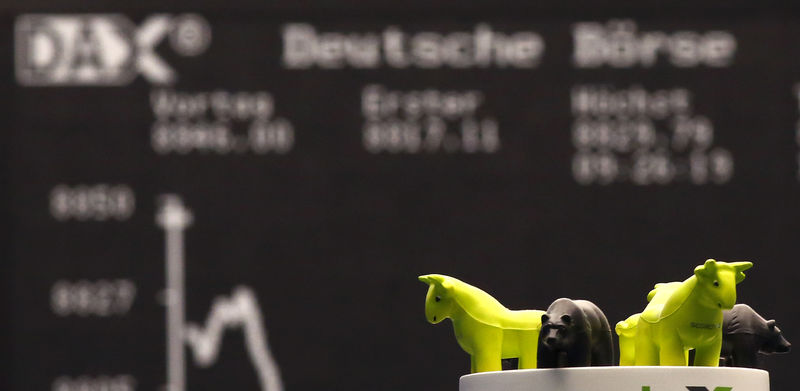Investing.com – European stock markets drifted Wednesday, with investors focusing on a deluge of third-quarter corporate earnings amid uncertainty over regional growth.
At 03:05 ET (07:05 GMT), the DAX index in Germany traded 0.1% lower, the CAC 40 in France fell 0.1%, while the FTSE 100 in the U.K. climbed 0.1%.
Deutsche Bank returns to profit
The corporate sector was in the spotlight in Europe Wednesday, as the third quarter earnings season kicked into top gear.
Deutsche Bank (ETR:DBKGn) stock fell over 3% after the lender warned of substantial credit losses in 2024, even as it bounced back to profit in the third quarter and announced plans for further share repurchases.
Lloyds Banking Group (LON:LLOY) stock rose 1.8% after the British lender reported third quarter profits that exceeded expectations, citing increasing financial confidence among its customers.
Heineken (AS:HEIN) stock rose 1.7% after the Dutch brewer reported a bigger than expected rise in organic net revenue in the third quarter.
WPP (LON:WPP) stock climbed 2.4% after the advertising giant reported a better-than-expected rise in like-for-like organic revenue in the third quarter, with growth in North America, western continental Europe and India partly offset by continued tough trading in China.
Iberdrola (OTC:IBDRY) stock rose 1.5% after Europe’s largest utility posted a 50% increase in net profit for the first nine months of the year, in a sign that its focus on Britain and the United States is paying off.
Finally, L’Oreal (EPA:OREP) stock fell 2.8% after the French cosmetics giant reported disappointing sales growth in the third quarter, citing weak demand in China for its beauty products.
The earnings deluge on Wall Street continues later Wednesday, with results due from such important names as AT&T (NYSE:T), Coca-Cola (NYSE:KO) and Boeing (NYSE:BA) before the open, and Tesla (NASDAQ:TSLA) and IBM (NYSE:IBM) after the close.
German growth concerns remain
Away from the individual corporate stories, sentiment in Europe remains weak given concerns about lackluster regional growth.
The International Monetary Fund on Tuesday said the German economy, Europe’s biggest, would stagnate this year, cutting its forecast from 0.2% growth previously.
For 2025, the IMF forecast Germany’s economy would grow only by 0.8%, having previously projected growth of 1.3%, while the eurozone economy, as a whole, is expected to grow by 0.8% in 2024 and 1.2% in 2025.
The European Central Bank cut interest rates last week, the central bank’s first back-to-back rate cut since 2011, and Reuters reported Wednesday that policymakers have begun to debate whether interest rates need to be lowered below a neutral setting, in order to start stimulating the economy.
Crude slips on US inventories rise
Oil prices slipped lower Wednesday following the release of industry data pointing to a rise in US crude inventories, but continued Middle East tensions have capped any losses.
By 03:05 ET, the Brent contract dropped 0.6% to $75.56 per barrel, while U.S. crude futures (WTI) traded 0.6% lower at $71.28 per barrel.
Data from the American Petroleum Institute, released Tuesday, showed that U.S. oil inventories grew 1.643 million barrels in the past week, spurring concerns that U.S. fuel demand was cooling.
Official U.S. government oil inventory data, from the Energy Information Administration, is due later on Wednesday.
Crude prices gained some ground in the prior session after Israel said it had killed Hashem Safieddine, the heir apparent to the late Hezbollah leader Hassan Nasarallah, who was killed last month by an Israeli strike.
Concerns about a possible escalation of the conflict between Israel and both Hamas and Hezbollah has seen traders attach a risk premium to crude prices, given the potential of supply disruptions to this oil-rich region.

